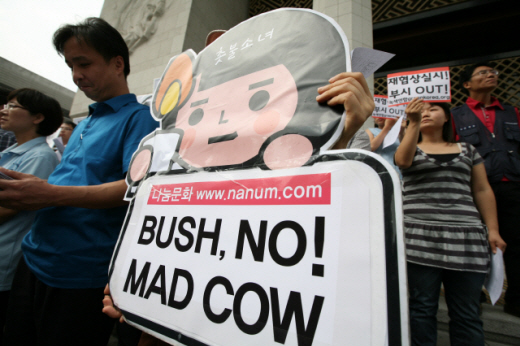Lee administration considers expansion of US beef imports

The Hankyoreh | 30 June 2010
Lee administration considers expansion of U.S. beef imports
Experts say measures implemented after the 2008 candlelight vigil demonstrations may be sacrificed for ratification of the KORUS FTA
President Lee Myung-bak’s promise to U.S. President Barack Obama to hold “additional working-level discussions” on the South Korea-U.S. Free Trade Agreement (KORUS FTA) made during the G-20 summit in Canada has indicated that the expansion of U.S. beef imports appears likely to become a topic of serious discussion once again. In particular, the strong chance of permitting imports of beef from cattle aged over 30 months, currently prohibited based on negotiations between trade authorities from both countries, has sparked concerns that this might invalidate the citizen health rights established through the 2008 candlelight vigil demonstrations.
Citizen opposition to the poorly conducted beef negotiations early in the Lee Myung-bak administration produced two sets of safeguards for health sovereignty. The first was the U.S. Quality System Assessment (QSA) Program. This program is an autonomous regulation by which U.S. meat exporters agreed to only export to South Korea beef from cattle aged under 30 months, with all material presenting a risk for mad cow disease removed.
Initially, the Lee administration had intended to allow all beef imports without any age restrictions prior to the South Korea-U.S. summit held in April 2008. However, when met with widespread resistance through the candlelight vigil demonstrations, it hurried into negotiations with the U.S. once again and made the decision in June of that year not to import beef from cattle aged over 30 months according to QSA.
The problem is that this program can easily change if trade authorities from both sides agree to it. The time limit for import prohibitions is ambiguous, given only as “until South Korean citizens’ confidence has been restored.” There is no method or standard for determining whether South Korean consumers’ trust in U.S. beef has been restored. Trade Minister Kim Jong-hoon did say at a press conference following the South Korea-U.S. summit that there was “no evidence that domestic consumer trust has recovered enough to import U.S. beef.” However, the question of how to apply this provision will inevitably become a topic of heated of debate if the U.S. Congress continues calling for the lowering the beef age restrictions as a precondition for ratifying the KORUS FTA.
Observers say the Act on the Prevention of Livestock Epidemics, amended by agreement between ruling and opposition parties in the wake of the candlelight vigil demonstrations, will likely be sacrificed in renewed KORUS FTA discussions. This amendment, which passed the National Assembly in August 2008, specified that beef from cattle aged over 30 months from countries where mad cow disease had occurred could only be imported five years after the occurrence. It also enabled temporary import suspension measures, should additional mad cow disease cases occur in the exporting country, and specified that the issue would be subject to National Assembly review at the time of resuming the suspended imports. These clauses stand in direct conflict with the KORUS FTA provisions regarding sanitary and phytosanitary standards (SPS) and trade dispute settlement procedures.
The debate over importations of beef from cattle aged over 30 months could become a touchstone for determining how the administration has taken the popular sentiments expressed in the June 2 local elections. In Taiwan last year, the ruling Kuomintang Party was routed in the December local elections after withdrawing embargo measures last October on U.S. beef containing bones from cattle aged under 30 months. As a result, the Taiwanese government and ruling party implemented an amended food hygiene law in January prohibiting the importation of ground beef and organs for all ages of cattle as part of an effort to win back popular sentiment.
“After the candlelight vigil demonstrations in 2008, President Lee Myung-bak appeared humbly before the people and said, ‘Citizens’ health cannot be exchanged for any reason,’” said Song Gi-ho, attorney and international trade expert.
“The Lee administration cannot regard the issue of citizen health rights as a point for FTA negotiation,” said Song.





